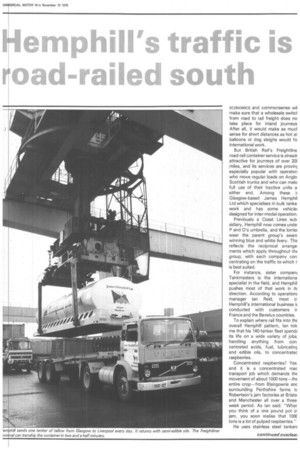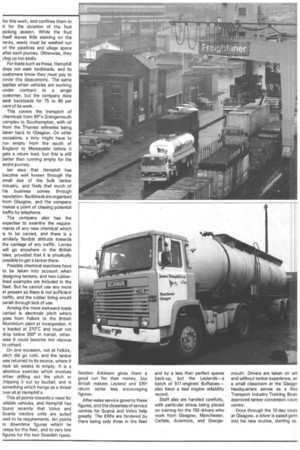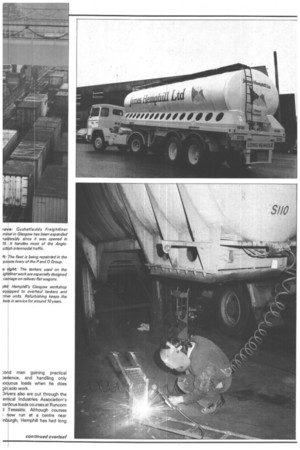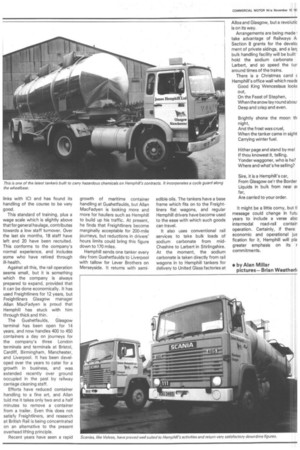Elemphill's traffic is oad-railed south
Page 61

Page 62

Page 63

Page 64

If you've noticed an error in this article please click here to report it so we can fix it.
ECONOMICS and commonsense wil make sure that a wholesale switcf from road to rail freight does no take place for inland journeys After all, it would make as mudl sense for short distances as hot ai balloons or dog sleighs would fo international work.
But British Rail's Freightline road-rail container service is alreadN attractive for journeys of over 20( miles, and its services are provinc. especially popular with operators who move regular loads on Anglo Scottish trunks and who can make full use of their tractive units a either end. Among these is Glasgow-based James Hemphil Ltd which specialises in bulk tanke work and has some vehicles designed for inter-modal operation.
Previously a Coast Lines sub sidiary, Hemphill now comes unde P and O's umbrella, and the lorries wear the parent group's aware winning blue and white livery. This reflects the reciprocal arrange. ments which apply throughout the group, with each company con. centrating on the traffic to which is best suited.
For instance, sister compan) Tankmasters is the internationa specialist in the field, and Hemphil pushes most of that work in its direction. According to operations manager Ian Reid, most o. Hemphill 's international business is conducted with customers ir France and the Benelux countries.
To explain where rail fits into the overall Hemphill pattern, Ian tole me that his 140-tanker fleet spends its life on a wide variety of jobs, handling anything from con. centrated acids, fuel, lubricatinc and edible oils, to concentratec raspberries.
Concentrated raspberries? Yes, and it is a concentrated roac transport job which demands the movement of about 1000 tons—the entire crop—from Blairgowrie one surrounding Perthshire farms tc Robertson's jam factories at Bristo and Manchester all over a three. week period. As Ian said: "Wher you think of a one pound pot 01 jam, you soon realise that 100( tons is a lot of pulped raspberries."
He uses stainless steel tankers for this work, and confines them to it for the duration of the fruit picking season. While the fruit itself leaves little staining on the tanks, seeds must be washed out of the pipelines and ullage space after each journey. Otherwise, they clog up too easily.
For loads such as these, Hemphill does not seek backloads, and its customers know they must pay to cover this diseconomy. The same applies when vehicles are working under contract to a single customer, but the company does seek backloads for 75 to 80 per cent of its work.
This covers the transport of chemicals from BP's Grangemouth complex to Southampton, with oil from the Thames refineries being taken back to Glasgow. On other occasions, a lorry might have to run empty from the south of England to Merseyside before it gets a return load, but this is still better than running empty for the entire journey.
Ian says that Hemphill has become well known through the small size of the bulk tanker industry, and finds that much of his business comes through reputation. Backloads are organised from Glasgow, and the company makes a point of chasing potential traffic by telephone.
The company also has the expertise to examine the requirements of any new chemical which is to be carried, and there is a similarly flexible attitude towards the carriage of any traffic. Lorries will go anywhere in the British Isles, provided that it is physically possible to get a tanker there.
Possible chemical reactions have to be taken into account when designing tankers, and two rubberlined examples are included in the Fleet. But he cannot use any more at present as there is not sufficient traffic, and the rubber lining would perish through lack of use.
Among the more awkward loads carried is electrode pitch which goes from Falkirk to the British Aluminium plant at Invergordon. It is loaded at 270°C and must not drop below 200° in transit, otherwise it could become too viscous to unload.
On one occasion, not at Falkirk, Ditch did go cold, and the tanker was returned to its source, where it took six weeks to empty. It is a aborious exercise which involves either drilling out the pitch or 2hipping it out by bucket, and is something which hangs as a threat Dyer all at Hemphill's.
This all points towards a need for -eliable vehicles, and Hemphill has Found recently that Volvo and Scania tractive units are suited Pest to its requirements. Ian points to downtime figures which he After-sales service governs these figures, and the closeness of service centres for Scania and Volvo help greatly. The ERFs are hindered by there being only three in the fleet and by a less than perfect spares back-up, but the Leylands— a batch of 511-engined Buffaloes— also have a bad engine reliability record. Staff also are handled carefully, with particular stress being placed on training for the 150 drivers who work from Glasgow, Manchester, Carlisle, Aviemore, and Grange mouth. Drivers are taken on wit and without tanker experience, an a small classroom at the Glasgoi headquarters serves as a Roa Transport Industry Training Boar( approved tanker conversion courE centre. Once through the 10-day courE at Glasgow, a driver is eased gent into his new routine, starting as ;on d man gaining practical Jerience, and handling only iocuous loads when he does in solo work. )rivers also are put through the emical Industries Association's Eardous loads courses at Runcorn Teesside. Although courses now run at a centre near Inburgh, Hemphill has had long Finks with ICI and has found its handling of the course to be very good. This standard of training, plus a wage scale which is slightly above thatforgeneral haulage, contributes towards a low staff turnover. Over the last six months, 18 staff have left and 20 have been recruited. This conforms to the company's normal experience, and includes some who have retired through ill-health. Against all this, the rail operation seems small, but it is something which the company is always prepared to expand, provided that it can be done economically. It has used Freightliners for 12 years, but Freightliners Glasgow manager Allan MacFadyen is proud that Hemphill has stuck with him through thick and thin. The Gushetfaulds, Glasgow terminal has been open for 14 years, and now handles 400 to 450 containers a day on journeys for the company's three London terminals and terminals at Bristol, Cardiff, Birmingham, Manchester, and Liverpool. It has been developed over the years to cater for a growth in business, and was extended recently over ground occupied in the past by railway carriage cleaning staff. Efforts have reduced container handling to a fine art, and Allan told me it takes only two and a half minutes to remove a container from a trailer. Even this does not satisfy Freightliners, and research at British Rail is being concentrated on an alternative to the present overhead lifting principle. Recent years have seen a rapid growth of maritime container handling at Gushetfaulds, but Allan MacFadyen is looking more and more for hauliers such as Hemphill to build up his traffic. At present, he finds that Freightliners become marginally acceptable for 200-mile journeys, but reductions in drivers' hours limits could bring this figure down to 170 miles. Hemphill sends one tanker every day from Gushetfaulds to Liverpool with tallow for Lever Brothers on Merseyside. It returns with semi edible oils. The tankers have a base frame which fits on to the Freightliners flat wagons, and regular Hemphill drivers have become used to the ease with which such goods can travel. It also uses conventional rail services to take bulk loads of sodium carbonate from midCheshire to Larbert in Stirlingshire. At the moment, the sodium carbonate is taken directly from rail wagons in to Hemphill tankers for delivery to United Glass factories at Alloa and Glasgow, but a revolutic is on its way. Arrangements are being made 1 take advantage of Railways A. Section 8 grants for the develoi ment of private sidings, and a larc bulk handling facility will be built • hold the sodium carbonate Larbert, and so speed the tun around times of the trains. There is a Christmas carol c Hemphill's office wall which reads Good King Wenceslaus look( out, On the Feast of Stephen, Whenthe snow lay round abouDeep and crisp and even. It might be a little corny, but tl message could change in futu years to include a verse abo intermodal road-rail contain operation. Certainly, if there economic and operational jus fication for it, Hemphill will pla greater emphasis on its r commitments. • by Alan Millar pictures— Brian Weatherli












































































































































































































































